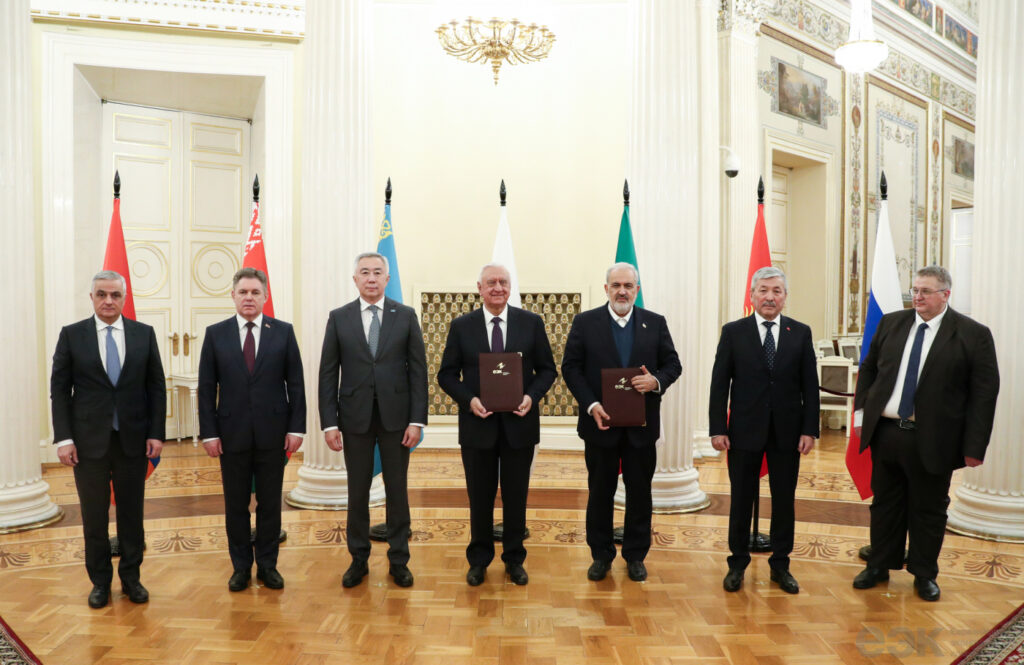On the sidelines of the Supreme Eurasian Economic Council’s meeting held on December 25 in St. Petersburg, a Free Trade Agreement was signed between the Eurasian Economic Union and its Member States, on the one part, and the Islamic Republic of Iran, on the other part.
The document was signed by: Mher Grigoryan, Vice-Prime Minister of the Republic of Armenia; Igor Petrishenko, Deputy Prime Minister of the Republic of Belarus; Serik Zhumangarin, Deputy Prime Minister of the Republic of Kazakhstan; Adylbek Kasymaliev, First Deputy Chairman of the Cabinet of Ministers of the Kyrgyz Republic; Alexei Overchuk, Deputy Chairman of the Government of the Russian Federation; Mikhail Myasnikovich, Chairman of the Board of the Eurasian Economic Commission, as well as Abbas Aliabadi, Minister of Industry, Mine and Trade of the Islamic Republic of Iran.

“The Free Trade Agreement between the EAEU and the Islamic Republic of Iran, which has now been signed, will bring trade between our countries to a whole new level,” Mikhail Myasnikovich emphasized. “The deal is ambitious – import customs duties will be eliminated on almost 90% of the product range, which accounts for more than 95% of our mutual trade.”
The Interim Agreement leading to the formation of a free trade area between the EAEU and its Member States, on the one part, and Iran, on the other part, which came into effect in 2019, has already made it possible to double the mutual trade turnover (from 2.4 bln US dollars in 2019 to 6.2 bln US dollars in 2022), while the commodity scope of the agreement was limited to a minimum set of agricultural and industrial products.
The EAEU and Iran agreed in the Interim Agreement that the preferential trade regime it creates will be the first stage of transiting to a full-fledged free trade regime.
“When negotiating the free trade agreement, we took the interim agreement in force since 2019 as a basis, which has shown its efficiency in practice. At the same time, we proceeded from two approaches. The first is to improve the regulatory part of our trade regime, and the second is to ensure duty-free trade between our countries in the widest possible range of goods. These two approaches were broadly sympathetic to both the EAEU and Iran. As a result, a deal has been formed that benefits all its participants,” noted Andrey Slepnev, Minister in charge of Trade of the Eurasian Economic Commission.
According to him, in accordance with the signed Free Trade Agreement “agrarians of the EAEU countries will have exclusive conditions for supplying to the Iranian market such essential goods as cereals, corn, vegetable oils, cattle and lamb meat, meat and poultry products, canned food, confectionery and a wide range of other agricultural products. As for industrial goods, the duty free trade regime will be established for a wide range of products of metal industry, chemical and woodworking industry, aircraft and shipbuilding, mechanical engineering, railway machinery and equipment and other products of the industrial sector.”
Additional arrangements were also reached in the non-tariff part: in the fields of technical regulation, sanitary, veterinary and phytosanitary measures, customs administration, electronic system for verifying the origin of goods, trade protection measures, and ensuring the necessary level of transparency in public procurement.
Furthermore, cooperation in a wide range of sectors will be developed within the agreement. These include mining, energy efficiency and green growth, research and innovation, education, medicine, and telecommunications. Given the importance attached by the governments of the EAEU countries and Iran to developing the North-South Economic Belt, special attention was paid to transport and logistics solutions as well as transit transportation issues.
Once signed, the Free Trade Agreement will be submitted for ratification procedures in Iran and the EAEU countries required for its enactment.
“Since the development of relations between the EAEU and Iran is given priority attention by all parties to the agreement, we believe that these procedures should not be delayed and the agreement will start working in the very near future,” Mikhail Myasnikovich summarized.
Source: https://eec.eaeunion.org/en/news/eaes-i-iran-sozdayut-polnoformatnuyu-zonu-svobodnoy-torgovli/#:~:text=The%20EAEU%20and%20Iran%20agreed,shown%20its%20efficiency%20in%20practice.
START EXPORTING TO RUSSIA TODAY
In case you’re interested in service, please don’t hesitate to contact us any time. You can submit a call request, set a task by filling out the simple form or contact one of our local representatives directly.

